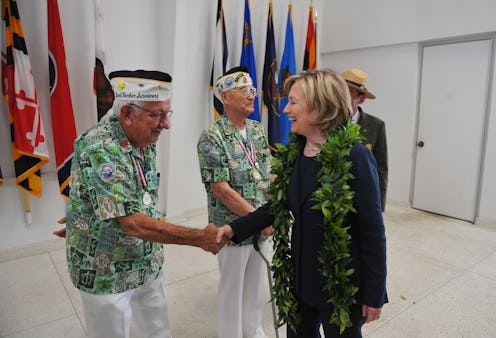News
How Hawaii's Delegates Affect The Election
The race for delegates continues this weekend for Democratic candidates Hillary Clinton and Sen. Bernie Sanders with voters casting ballots in Hawaii, Alaska, and Washington. With Washington holding a significantly larger slice of Saturday's delegate pie — the state allocates more than triple the number of delegates Hawaii does — it's unclear how, or even if, islands will have much impact on the primary race. But how many delegates does Hawaii have, and how could they affect the Democratic primary race?
Hawaiian Democratic voters will caucus on Saturday in the first step of the delegate selection process. The state will send 34 delegates to the Democratic National Convention later this summer. Of those 34, 16 will be district-level delegates, three will be pledged PLEO delegates, six will be at-large delegates, and nine will be superdelegates. With delegates proportionately awarded according to the results of the state's Democratic caucuses and Clinton currently leading Sanders by 303 pledged delegates, neither candidate is likely to secure the party's nomination thanks to Hawaii's delegates.
Democrats have long dominated Hawaii's politics, and as a result, the state regularly struggles to get people to the polls. In fact, Hawaii has one of the lowest voter turnout rates of all the 50 states. In 2012, when Hawaii-born President Barack Obama sought re-election, voter turnout in Hawaii was the lowest in the country. Comparatively, the state saw voter turnout in its 2008 Democratic primary — when Obama first sought office — skyrocket with 37,500 party members caucusing.
Despite Hawaii's Democratic leanings, it can often be difficult for those of us on the mainland to analyze how candidates are performing among voters on the Hawaiian Islands. On Tuesday, Hawaii State Rep. Kaniela Ing followed Hawaii Congresswoman Tulsi Gabbard's lead to throw his endorsement behind Sanders, citing current economic inequality and the need for campaign finance reform as his motivation.
"I have experienced first hand that upward mobility has dithered in our nation and how big money has corrupted and allowed this to happen. Campaign finance reform must be a priority for our next president," Politico reported Ing said. "As a Democrat facing my own primary challenger, I have been advised to stay neutral in presidential politics. But I cannot remain neutral any longer. This election is far too important. That's why today I am endorsing Sen. Bernie Sanders to be the next president and commander in chief of the United States, the only candidate willing to walk the talk to get big money out of politics."
Hawaii's upcoming caucus is unlikely to significantly alter the course of the Democratic presidential primary, but every vote — and every delegate — counts in the race to secure the 2,383 needed to obtain the nomination.
